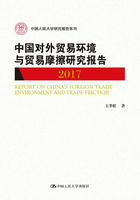
参考文献
[1]巴格瓦蒂·贾格迪什.现代自由贸易.北京:中信出版社,2003.
[2]李坤望,王孝松.申诉者政治势力与美国对华反倾销的歧视性——美国对华反倾销裁定影响因素的经验分析,世界经济,2008 (6).
[3]潘圆圆.中国被反倾销的实证分析,经济科学,2008 (5).
[4]沈国兵.美国对中国反倾销的宏观决定因素及其影响效应.世界经济,2007 (11).
[5]谢建国.经济影响、政治分歧与制度摩擦——美国对华贸易反倾销实证研究.管理世界,2006 (12).
[6]Anderson, Keith B.. Agency Discretion or Statutory Direction:Decision Making at the US International Trade Commission.Journal of Law and Economics,1993 (36):915-935.
[7]Aggarwal, Aradhna.Macro Economic Determinants of Antidumping:A Com-parative Analysis of Developed and Developing Countries.World Development,2004,32 (6):1043-1057.
[8]Baldwin Robert E..The Political Economy of U.S. Import Policy. Cambridge:MIT Press,1985.
[9]Baldwin Robert E.and Jeffrey W.Steagal.l An Analysis of ITC Decisions in Antidumping, Countervailing Duty and Safeguard Cases.Wdltwirtschaftliches Archiv,1994 (130):290-308.
[10 ] Blonigen, Bruce and Bown, Chad. Antidumping and Retaliation Threats.Journal of International Economics,2003 (60):249-273.
[11]Blonigen, Bruce and Thomas J.Prusa.Antidumping in Handbook of Inter-national Economics. E. Kwan Choi and James Harrigan, eds. Malden, MA, Blackwell Publishing,2003.
[12]Bown Chad P..China's WTO Entry:Antidumping, Safeguards, and Dispute Settlement.NBER Working Paper No.13349,2007.
[13]Bown, C. and M. Crowley.Trade Deflection and Trade Depression.Journal of International Economics,2007 (72):176-201.
[14]Bown, C.and M.Crowley.China's Export Growth and the China Safeguard:Threats to the World Trading System? .mimeo, Brandeis University,2007b.
[15]Bown Chad P.and Rachel McCulloch.U.S.trade policy toward China:dis-crimination and its implications.Paper for presentation at the PAFTAD 30 conference at the East-West Center in Honolulu,2005.
[16]DeVault, James M.. Economics and the International Trade Commis-sion.Southern Economic Journal,1993,60 (2):463-478.
[17]Feinberg, Robert.Exchange Rates and Unfair Trade.Review of Economics and Statistics,1989,71 (4):704-707.
[18]Feinberg, R.M., & Hirsch, B.T..Industry Rent Seeking and the Filing of“Unfair Trade”Complaints.International Journal of Industrial Organisation,1998 (7):325-340.
[19]Feinberg, Robert M.and Kara M. Olson.The Spread of Antidumping Re-gimes and the Role of Retaliation in Filings. American University Working Paper,2004.
[20]Feinberg, Robert M.and Kara M.Olson.Tariff Liberalization and Increased Administrative Protection:Is There a Quid Pro Quo? . American University Working Paper,2005.
[21]Finger, J.Michae.l The Industry-Country Incidence of“Less than Fair Val-ue”Cases in US Import Trade. Quarterly Review of Economics and Business,1981 (21):260-279.
[22]Finger, J.Michael, H.Keith Hall, and Douglas R.Nelson.The Political Economy of Administered Protection.American Economic Review,1982 (72):452466.
[23]Finger, J. Michael, Merlinda Ingco and Ulrich Reincke. The Uruguay Round:Statistics on Tariff Concessions Given and Received. World Bank:Washington, DC,1996.
[24]Furusawa, Taiji, and Thomas J.Prusa.Antidumping Enforcement in a Re-ciprocal Model of Dumping:Theory and Evidence.manuscript,1996.
[25]Hansen, Wendy. The International Trade Commission and the Politics of Protectionism.American Political Science Review,1990 (84):21-46.
[26]Hansen, Wendy L. and Thomas J. Prusa.Cumulation and ITC Decision Making:The Sum of the Parts is Greater than the Whole.Economic Inquiry,1996,34 (4):746-769.
[27]Hansen, Wendy L. and Thomas J. Prusa.The Economics and Politics of Trade Policy:An Empirical Analysis of ITC Decision Making.Review of International Economics,1997,5 (2):230-245.
[28]Knetter, Michael and Prusa, Thomas. Macroeconomic Factors and Anti-dumping Filings:Evidence from Four Countries.Journal of International Economics,2003 (61):1-17.
[29]Mah, Jai. Antidumping Decisions and Macroeconomic Variables in the USA.Applied Economics,2000 (32):1701-1709.
[30]Moore, Michael O.Rules or Politics? An Empirical Analysis of ITC Ant-i dumping Decisions.Economic Inquiry,1992,30 (3):449-466.
[31]Prusa Thomas J..Cumulation and Anti-dumping:A Challenge to Compet-i tion.World Economy,1998 (21):1021-1033.
[32]Sabry, F..An Analysis of the Decision to File, the Dumping Estimates and the Outcome of Antidumping Petition.International Trade Journal,2000 (14):109-145.
[33]USITC.Antidumping and Countervailing Duty Handbook.Eleventh Edition, Publication 3750, United States International Trade Commission,2005.
[34]Zanardi, M..Antidumping:What are the Numbers to Discuss at Doha? . The World Economy,2004 (27):403-433.